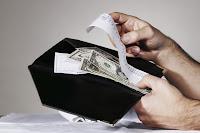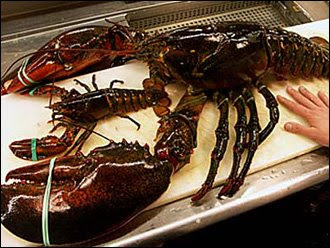Tips, Automatic Gratuities, Service Charges - And Now The IRS?
An updated tax rule is causing restaurants to rethink the practice of adding automatic tips to the tabs of large parties.
Starting in January, the Internal Revenue Service will begin classifying those automatic gratuities as service charges—which it treats as regular wages, subject to payroll tax withholding—instead of tips, which restaurants leave up to the employees to report as income.
The change would mean more paperwork and added costs for the restaurants—and a potential financial hit for waiters and waitresses who live on their tips but don't always report them fully.
Darden Restaurants Inc., owner of Olive Garden, LongHorn Steakhouse and Red Lobster, has long included automatic 18% tips on the bill for parties of eight or more at its more than 2,100 restaurants, but is experimenting with eliminating them because of the IRS ruling, said a spokesman.
The chain in July stopped automatic tips at 100 restaurants in four cities, where it is testing a new system in which the restaurants include three suggested tip amounts, calculating for the customer the total with a 15%, 18% or 20% tip on all bills, regardless of party size. Diners can opt to tip more or less than the suggested amounts, or to not tip. Depending on how patrons react and how well the new software system works, Darden may switch to such suggested tips at all of its restaurants. A spokesman said the company will decide by year-end.
Texas Roadhouse Inc., which includes a tip of 15% for parties of eight or more at many of its more than 390 restaurants, is planning to phase out automatic gratuities by the end of the year, a spokesman said.
"I think the vast majority of restaurant owners will discontinue the practice," says Denise Wheeler, an employment attorney in Fort Myers, Fla., who represents several restaurant chains.
The change will complicate payroll accounting for restaurants that stick with automatic tips, because they will need to factor those tips into pay, meaning hourly pay rates—could vary day to day depending on how many large parties are served.
Restaurants are required to report to the IRS what its employees report receiving for tips and to pay Medicare and Social Security taxes on those amounts. Restaurants are eligible for an income-tax credit for some or all of those payments, but service charges aren't eligible, according to Marianna Dyson, a payroll tax attorney in Washington, D.C., who represents restaurant chains.
The change comes amid increasing costs and record-keeping requirements for restaurants. In January, restaurants with 50 or more full-time workers will be required to offer health coverage to employees working 30 or more hours a week, though penalties don't begin until 2015.
Restaurants adopted automatic gratuities to help ensure that their servers—whose tips supplement a salary that is often less than the federal minimum wage of $7.25 an hour—weren't stiffed on large tabs. But many servers are likely to support dropping the practice because they don't like the idea of their tips being treated as wages, which requires upfront withholding of federal taxes, and means they won't see that tip money until payday.
"I don't want my tips to be on my paycheck as a wage. I like to get my tips at the end of my shift because I know what I'm getting right away," says Tamie Cordoba, a 54-year-old server at a LongHorn Steakhouse in Jacksonville, Fla.
Ms. Cordoba makes base wages of $4.25 an hour, or $144.50 to $161.50 for her average workweek of 34 to 38 hours. She said she usually makes an additional $500 to $650 a week in tips. Since she never knows exactly how much she will get each week in tips, getting paid at the end of each shift helps her budget, Ms. Cordoba said. "In this industry, that's what we live on. If I had to wait two weeks I don't know how I'd survive."
The Cheesecake Factory Inc. suggests an 18% gratuity for parties of six or more, says a spokeswoman, but "We advise our guests that leaving a gratuity is always discretionary." She said the company is now reviewing its policy.
The IRS ruling was issued in 2012 to clarify and update earlier tax guidance on tips, which didn't spell out how automatic tips were to be treated. Restaurants persuaded the agency to delay implementation until next year.
In a statement, the IRS said it noticed an increase in the use of "auto-gratuities" and that it believed "additional clarification in this area would be in the best interest of tax administration."
The updated rule says the automatic tips are service charges because they aren't voluntary. In a question-and-answer section of the ruling, the IRS provided an example of a restaurant suggesting different tip amounts, and said that practice isn't subject to federal withholdings because the customer is still free to choose whether and how much to tip.
Still, the ruling has caused some confusion. Some restaurants insert an amount on the tip line and then remind guests on the check that they are free to adjust that amount up or down. Ms. Dyson, the payroll tax attorney, said that practice could come under scrutiny from the IRS. "How far can you go before the IRS says that looks like a service charge?" Ms. Dyson says.
Wall Street Journal, IRS Rule Leads Restaurants to Rethink Automatic Tips



In Miami the auto grat is on all checks (for many restaurants in places like Miami Beach anyway), so how does this new rule apply to across the board automatic tips, not just parties of 6 or more? What changes have any of the local restaurants made?
ReplyDeleteIn my opinion, local restaurants do not have to make any changes other than to declare the "automatic gratuities" as wages, something they should have done prior to the enactment of the new IRS code. All tips are income and need to be declared as such. In the past restaurants may have just declared the minimum 8% of your sales to keep from triggering an IRS audit. The more you pay in Social Security and Medicaid the more the restaurant pays (they are required to match you contribution) and the better for the employee in the long run. No wonder restaurants have been under reporting for years.
ReplyDeleteSince the beginning of the year, I know I have suffered a lot financially. The hibachi restaurant that I have worked for requires us to pay 10% of our total sale to the chefs, bartenders, sushi chefs and bussers. If we are lucky to get 15%. That means we go home with 5%.
ReplyDeleteThey do not care what we actually make. Often times
we do not get anything, yet, we still need to pay out. Chefs gets side tips that they keep and not required to share. There are also times when the customer tips the chefs and then tip us nothing or a dollar or two. We still need to tip out 9% of the total food sale to the chefs. Is there a violation of equal employment opportunity law if we tip out 2/3 of what we make. Sometimes, we may end up going home with nothing or owning $. Where is the fairness in this employment?
If a restaurant emphases is on the so call performance of the so call chefs, should they not pay them a chefs salary and a higher hourly wage to the servers other than the $4.91, if they are not going to supplement their income with tips.
ReplyDeleteThis is infuriating! A party of 20 walks in requiring two servers. They get stiffed. So they make 4.50 an hour for putting up with your drunk unkle. This is a HUGE example of screwing the small guy/girl busting their ass! The restaurants will discontinue auto grats cause its money out of their profits. This is total BS. Some fat late ass beauraucrat eating a jelly donut just made this up to pretend like he has an actual job. If you agree with me.....I will fight this. E-mail me at gerard5461@gmail.com. BTW I'm a chef not a server.
ReplyDeleteThis is infuriating! A party of 20 walks in requiring two servers. They get stiffed. So they make 4.50 an hour for putting up with your drunk unkle. This is a HUGE example of screwing the small guy/girl busting their ass! The restaurants will discontinue auto grats cause its money out of their profits. This is total BS. Some fat late ass beauraucrat eating a jelly donut just made this up to pretend like he has an actual job. If you agree with me.....I will fight this. E-mail me at gerard5461@gmail.com. BTW I'm a chef not a server.
ReplyDeleteYour way to enlighten everything on this blog is actually pleasant, everyone manage to efficiently be familiar with it, Thanks a great deal. Dog bites Chicago IL
ReplyDelete